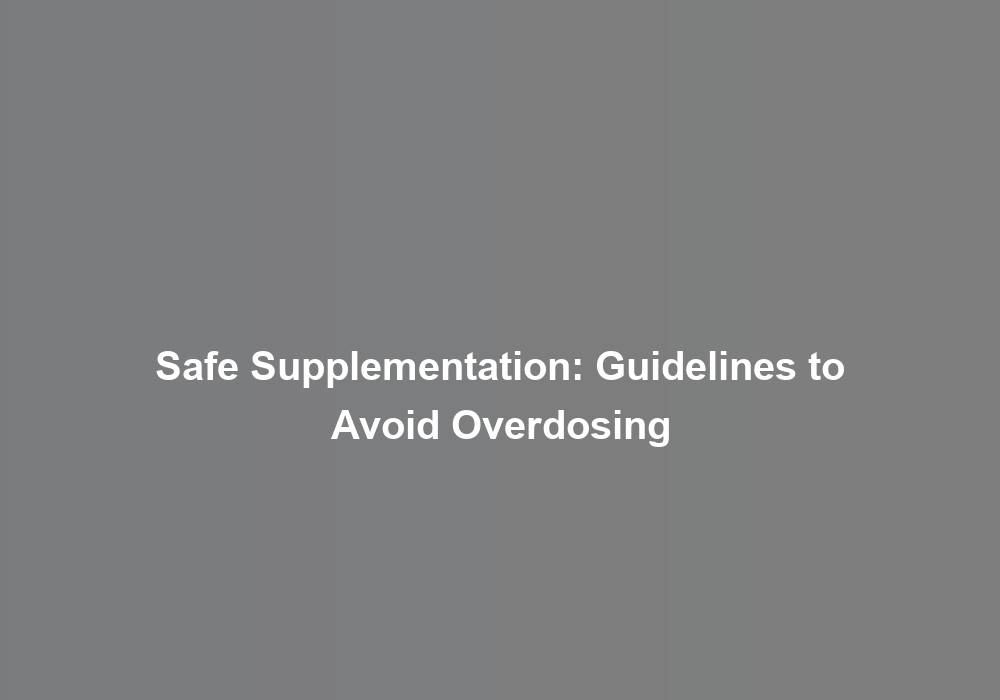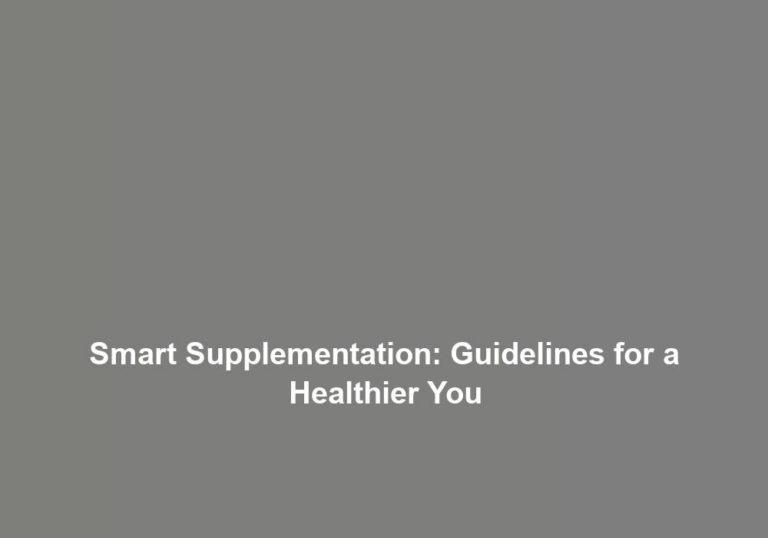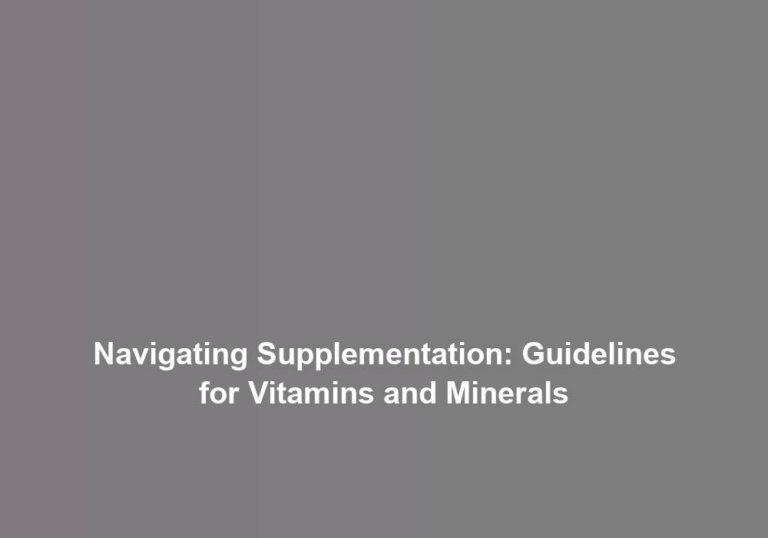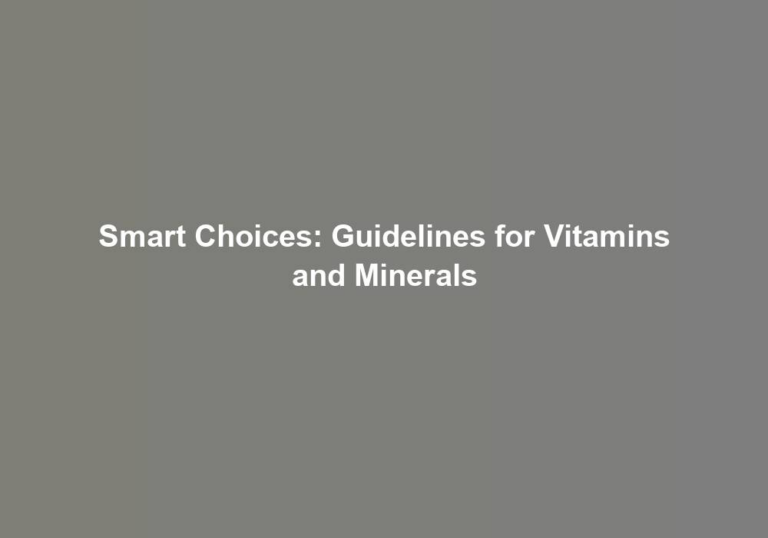Safe Supplementation: Guidelines to Avoid Overdosing
Navigating the world of supplementation can be like walking through a maze – tricky, but manageable with the right guidance. With so many options available, itG??s easy to feel overwhelmed and unsure of how to proceed. But fear not, because understanding the guidelines for safe supplementation is like having a map to help you navigate through the maze. By following these guidelines, you can ensure that youG??re taking the right steps to avoid overdosing and maximize the benefits of your supplements. So, letG??s explore these essential guidelines together and ensure that youG??re on the right track to safe and effective supplementation.
Understanding Recommended Dosages
Understanding the recommended dosages for supplements is crucial to ensure their safe and effective use in supporting your health and wellness goals. Recommended dosages are established based on scientific research to provide the optimal amount of a supplement for most individuals. ItG??s important to note that individual needs may vary, so itG??s advisable to consult with a healthcare professional to determine the appropriate dosage for your specific circumstances.
Exceeding recommended dosages can lead to adverse effects and potential interactions with other medications or supplements you may be taking. For example, taking excessive vitamin D can result in elevated calcium levels in the blood, leading to nausea, vomiting, and weakness. Similarly, high doses of certain herbs, such as St.-?JohnG??s Wort, can interact with prescription medications, affecting their efficacy.
On the other hand, consuming less than the recommended dosage may not provide the desired health benefits. In some cases, supplements may have a cumulative effect in the body, requiring consistent intake at the recommended dosage to achieve the intended results.
To ensure safe and effective supplementation, itG??s essential to adhere to recommended dosages and be mindful of potential interactions with other supplements or medications. Always read the labels and follow the dosing instructions provided by the manufacturer. Additionally, discussing your supplement regimen with a healthcare professional can help mitigate the risk of adverse effects and interactions, ultimately supporting your journey towards optimal health and wellness.
Identifying Risk Factors
Before starting any new supplement regimen, itG??s important to consider the potential risk factors that may affect your bodyG??s response to the supplements. Look out for signs of potential overdose, such as nausea, dizziness, or rapid heartbeat, and be mindful of any pre-existing health conditions that could interact with the supplements. Remember to monitor your supplement intake closely, and consult with a healthcare professional if you have any concerns about potential risks.
Risk Factors to Consider
Identifying potential risk factors is essential when considering safe supplementation, as it enables you to make informed decisions about your health and well-being. When identifying risk factors, itG??s crucial to consider the following:
- Medical History: Understanding your medical history, including any pre-existing conditions or illnesses, can help identify potential risks associated with supplementation.
- Medication Interactions: Certain supplements may interact with medications, leading to adverse effects. ItG??s important to consult with a healthcare professional to prevent complications.
- Allergic Reactions: Being aware of any allergies is critical, as some supplements may contain allergens that could trigger adverse reactions.
Signs of Potential Overdose
When considering safe supplementation, itG??s important to be aware of the signs that may indicate a potential overdose, as being vigilant can help prevent adverse health effects. Recognizing symptoms of potential overdose is crucial for maintaining safe supplementation practices. Symptoms may include nausea, vomiting, diarrhea, headaches, dizziness, rapid heartbeat, and difficulty breathing. Additionally, signs such as confusion, irritability, and extreme fatigue should not be ignored. If you experience any of these symptoms, itG??s important to seek help immediately. Overdosing on supplements can have serious consequences, potentially leading to organ damage or failure. Seeking help from a healthcare professional or contacting a poison control center is vital in such circumstances. Remember, being mindful of these symptoms and seeking help promptly can help prevent the negative effects of an overdose.
Monitoring Supplement Intake
To ensure safe supplementation, it is essential to be mindful of potential risk factors associated with supplement intake, which can vary based on individual health conditions and medication interactions. When monitoring your supplement intake, consider the following:
-
Tracking Progress: Keep a record of the supplements you take and any changes in your symptoms or overall health. This can help identify any potential issues or improvements related to your supplementation.
-
Setting Limits: ItG??s important to adhere to recommended dosage guidelines and not exceed the daily intake limits for specific supplements. Setting limits can help prevent adverse effects or overdosing.
-
Consulting Healthcare Providers: Discuss your supplement regimen with your healthcare provider, especially if you have underlying health conditions or are taking medications that may interact with supplements.
Monitoring for Potential Side Effects
Monitoring for potential side effects is essential when introducing new supplements into your routine. Proper monitoring allows you to stay aware of any potential interactions or adverse reactions that may occur. It is important to remember that even natural supplements can have side effects, especially when taken in high doses or in combination with other medications or supplements.
Start by familiarizing yourself with the common side effects associated with the specific supplements you are taking. This information can typically be found on the product label or insert. Pay attention to any changes in your body, such as digestive issues, headaches, changes in energy levels, or allergic reactions. If you experience any concerning symptoms, it is crucial to consult with a healthcare professional promptly.
Additionally, keep track of the timing and dosage of your supplements. If you notice any new symptoms or changes in your health after starting a new supplement, consider whether they could be related to the timing of your intake. Sometimes, adjusting the timing of your supplements can help mitigate potential side effects.
Remember that everyoneG??s body is different, and what works for one person may not work for another. Always listen to your body and consider seeking professional advice if you have any concerns. By staying vigilant and responsive to potential side effects, you can ensure a safe and effective supplementation routine.
Consulting With Healthcare Professionals
When considering supplementation, it is crucial to consult with healthcare professionals to ensure the safe and effective use of these products. Their expert guidance is essential in determining the appropriate supplements for your specific health needs. Input from a healthcare professional can provide valuable insight into potential interactions, contraindications, and optimal dosages for your individual circumstances.
Importance of Consultation
When considering adding supplements to your daily routine, it is crucial to consult with a healthcare professional to ensure safety and efficacy. Consulting with a healthcare professional offers several benefits, including:
- Personalized Advice: A healthcare professional can provide personalized advice based on your individual health status, potential interactions with medications, and specific nutritional needs.
- Avoiding Overdosing: Professional advice can help prevent overdosing, as some supplements can lead to toxicity when taken in excessive amounts.
- Monitoring for Adverse Effects: Healthcare professionals can monitor you for any adverse effects or changes in health that may result from supplement use, ensuring early detection and management if needed.
Consulting with a healthcare professional is essential for safe and effective supplementation, and it provides the support and guidance necessary for your well-being.
Expert Guidance Essential
As you seek safe and effective supplementation, consulting with a healthcare professional is essential to receive personalized advice and avoid potential risks associated with supplements. Expert advice from a healthcare professional can provide invaluable insights into the appropriate dosage management for your specific health needs. By seeking guidance from a qualified healthcare provider, you can ensure that the supplements you take are suitable for your individual health status, potential interactions with medications, and any underlying health conditions. Healthcare professionals can also help you navigate the complex landscape of supplement options, ensuring that you select products that are safe, effective, and appropriate for your unique circumstances. Ultimately, consulting with a healthcare professional is crucial in optimizing the benefits of supplementation while minimizing the risks.
Health Professional Input
Seeking guidance from a qualified healthcare provider is essential for ensuring the safe and effective use of supplements tailored to your individual health needs and circumstances. When considering supplement use, obtaining professional advice from a healthcare perspective can provide valuable insights and personalized recommendations. Here are key reasons why consulting with a healthcare professional is crucial:
- Individualized Assessment: A healthcare provider can conduct a comprehensive evaluation of your health status, medical history, and current medications to determine the most suitable supplements for you.
- Risk Evaluation: Professional advice can help assess potential risks and interactions between supplements and existing health conditions or medications.
- Optimal Dosage: Healthcare professionals can offer guidance on the appropriate dosage of supplements to maximize benefits and minimize any adverse effects.
Consulting with a healthcare professional ensures that your supplement use aligns with your specific health needs and promotes safe and effective outcomes.
Considering Nutrient Interactions
To ensure safe and effective supplementation, it is crucial to consider how different nutrients interact with each other in your body. Nutrient interactions can significantly impact the absorption and utilization of supplements, making it essential to be mindful of dietary restrictions and potential conflicts between different nutrients. For example, the absorption of iron can be hindered by calcium and vice versa, which means taking these two supplements together may not be beneficial. Similarly, high doses of zinc can interfere with copper absorption, leading to potential deficiencies.
Understanding these interactions is vital for making informed decisions about supplementation. If you have dietary restrictions or are following a specific eating plan, such as a vegan or gluten-free diet, itG??s important to be aware of potential nutrient interactions that may affect absorption. For instance, individuals following a vegan diet may have a higher risk of vitamin B12 deficiency and could benefit from supplementation, but itG??s important to consider how other nutrients like iron or zinc might be impacted by the supplement.
ItG??s also crucial to consult with a healthcare professional or a registered dietitian to understand how different nutrients interact and affect your individual health status. They can provide personalized recommendations based on your specific needs and help you avoid potential adverse effects or nutrient imbalances. By considering nutrient interactions and seeking professional guidance, you can optimize the effectiveness and safety of your supplementation regimen.
Practicing Safe Storage and Handling
When storing and handling dietary supplements, it is important to ensure proper conditions to maintain their potency and safety. Proper storage and safe handling practices can help prevent contamination, degradation, and potential harm to individuals. Here are some guidelines to ensure the safe storage and handling of dietary supplements:
-
Store in a Cool, Dry Place: To maintain the potency of your supplements, store them in a cool, dry place away from direct sunlight and moisture. Exposure to heat and humidity can cause the ingredients to break down, reducing their effectiveness.
-
Keep Away from Children and Pets: Store supplements out of reach and sight of children and pets. Accidental ingestion of supplements can pose serious health risks, especially for young children and animals.
-
Follow Label Instructions: Adhere to the storage instructions provided on the supplement labels. Some supplements may have specific storage requirements, such as refrigeration, to maintain their stability and efficacy.
Conclusion
In conclusion, remember to always follow recommended dosages, be aware of potential risk factors, monitor for side effects, consult with healthcare professionals, and consider nutrient interactions when supplementing. ItG??s essential to practice safe storage and handling to avoid any mishaps. Taking these precautions will ensure that you are as safe as a baby in a padded room when it comes to supplementing. Stay informed, stay safe, and stay healthy!







